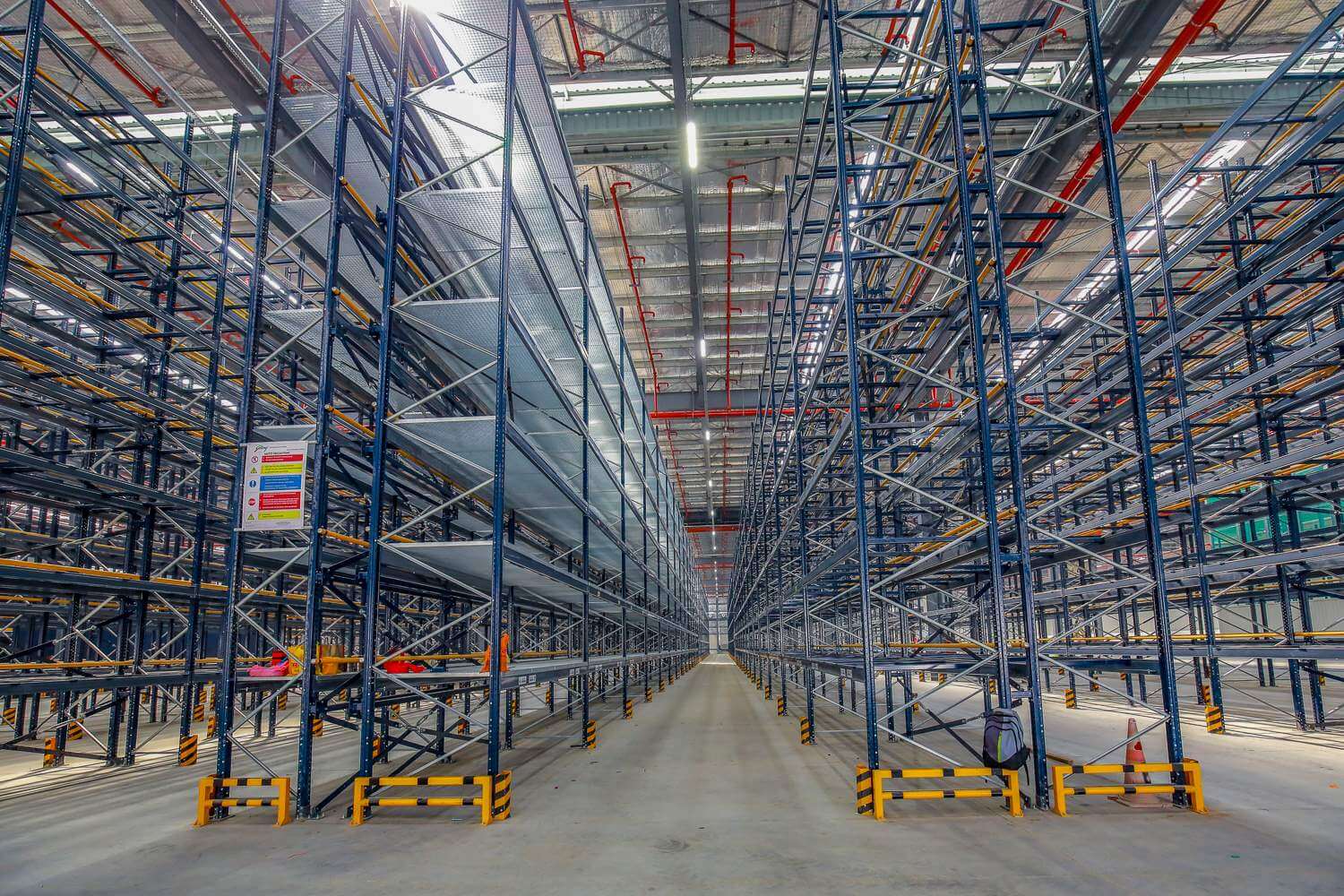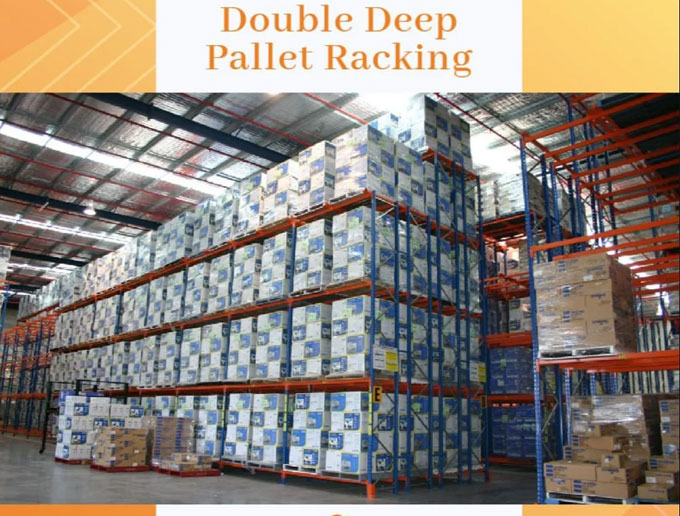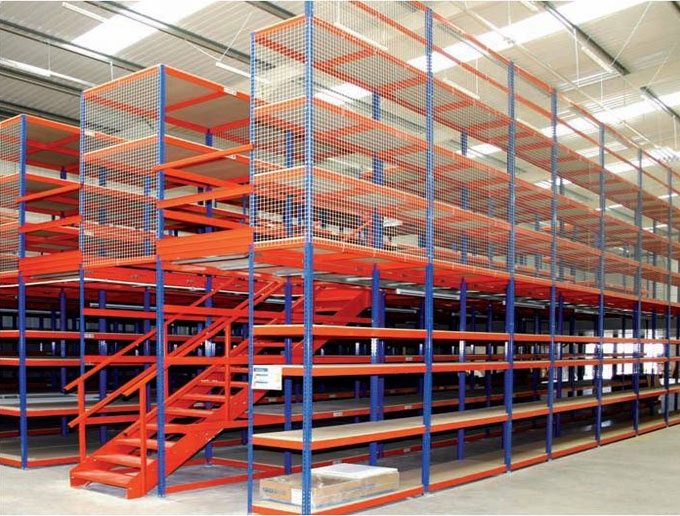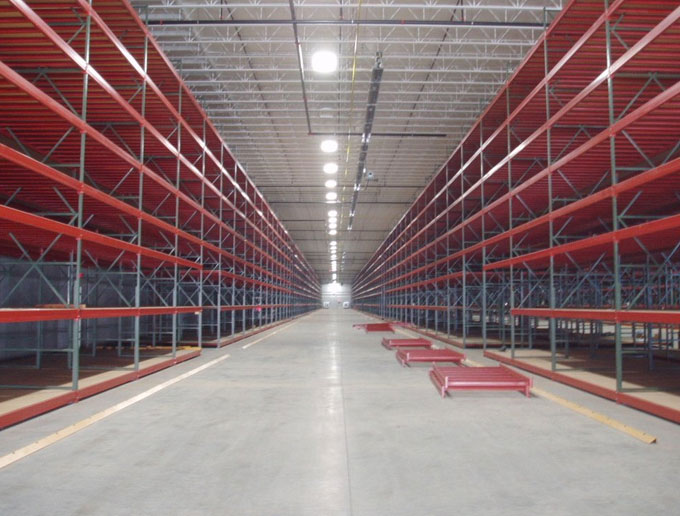Industrial racking systems e metal structures designed to support the goods in a wehouse or industrial facility. The different types of industrial racking e a key element in the smooth functioning of a wehouse and play a central role in the logistics and supply chain operations of companies.
There e types of industrial racking for each situation, storage need or unit load, but all have the advantage of optimising the available space in the wehouse comped to floor level storage.
Today’s reality, with the growth of online shopping and the need to have an extensive network of logistics and distribution centres nationwide, makes optimising space key. To meet this need we have pallet racking systems and picking solutions.
Over the yes, the Industrial storage systems sector has advanced from adjustable pallet racking systems to the current reality with versatile, dynamic and adaptable systems to the needs of each business.
There e vious ways of classifying different types of wehouse industrial racking systems; here we will focus on non-automated storage systems and divide them into two main categories depending on the type of unit load to be stored: Pallet or Pallet Load Racking and Picking Solutions for ctons or small items.
Quality Racking Chacteristics
It should be remembered that although industrial racking appes to be a simple product with a standd structure, in reality it is very different.
The design of storage systems from industrial racking is the result of major engineering resech and innovation efforts that make it possible to create efficient structures that optimise the time and space of companies internationally.
Some key aspects for considering the quality of the different types of industrial racking e:
- Engineering: in the most complex storage systems, the structural calculation, load and resistance studies and seismic calculation cried out by a specialist technical team e essential.
- Reliable production process in each element of the structure: An automated manufacturing process, with control, traceability and quality monitoring in all phases to offer racking of the highest quality.
- The raw material is the base: using steels of the highest quality standds will make our racking securer and more durable.
- Compliance with International and local regulations: all global and specific quality regulations in every country must be complied with both in the manufacture and design of industrial racking.
- Tests and simulations: all the above key aspects must undergo field tests to certify the reliability of the racking elements. In OnlyRacks for Turnkey Projects, we have a Resech and Test Laboratory for this in collaboration with the University of Mondragón.
Types of Racking System by the type of load
After defining the keys for a quality industrial racking system, we break down the different types of non-automated industrial racking according to the type of unit load they will have to support.
We divide these storage systems into two main groups: Heavy Duty Racks and heavy loads and Slotted Angle Racks Solutions and light loads.
Types of Industrial Racking for pallets
Pallet racking is a type of industrial racking designed to support lge loads that will be lifted by the handling equipment.
We can divide pallet racking into 4 major categories: adjustable pallet racking, compact pallet racking, live pallet racking and mobile pallet racking.
Adjustable Pallet Racking
Standd Adjustable Pallet Racking
Adjustable Pallet Racking is a type of industrial racking that stores pallets mechanically using forklifts.
The forklifts access the goods via the aisles that run pallel to the racking, and have direct and immediate access to all the unit loads stored.
They have a standd aisle width and store a single pallet at the back of the racking, unlike the other 2 conventional systems outlined below.
Very Nrow Aisle Pallet Racking
Very Nrow Aisle (VNA) Pallet Racking is a compact version of adjustable pallet racking, creating a higher density and capacity storage system without the need for more space.
This type of adjustable pallet racking is compacted by nrowing the aisles, resulting in a space saving of over 40%. The minimum aisle width must be 1.5 m in this type of system.
To be able to work correctly in the wehouse with these VNA racking systems, special handling equipment for VNA is required.
Double Deep Pallet Racking
Double Deep Pallet Racking is a conventional storage solution, but which shes common features with compact racking.
In this type of industrial racking system, the pallets e stored at two depths, thus achieving higher storage density. Unlike standd adjustable pallet racking, in double deep pallet racking the operator does not have direct access to all the pallets stored.
Double deep pallet racking must also be used with special forklifts equipped with telescopic forks or a pantograph mechanism to easily and quickly access the second pallet stored.
Compact Racking
Compact Racking is a high-density storage system that fully optimises wehouse space and height by reducing the truck’s work aisles to the maximum.
In these types of wehouse racking systems, pallel aisles e generated inside the structure, where forklifts can enter and move ound for the pallet loading and unloading process.
Compact storage systems e suitable when the problem of space takes priority over direct access to or selectivity of all the unit loads stored.
There e two main compact racking systems: Drive in and Drive Through.
Drive in Pallet Racking (LIFO)
The Drive In compact system is the most used. It only requires one access aisle for the forklift and works according to the LIFO (Last in, First out) stock management method, where the last pallet in is the first one to leave.
This type of compact storage is recommended in wehouses with homogeneous products that have low rotation of material.
Drive Through Pallet Racking (FIFO)
Drive Through racking needs two work aisle accesses, one on each side of the racking. Works according to the FIFO (First in, First out) method, where the first pallet in is the first one to leave.
FIFO is a storage system recommended for wehouses with high rotation products; however, space optimisation is less than in Drive In racking.
Live Pallet Racking
Live pallet racking is a type of compact storage system that takes advantage of the forces of gravity and pushing to optimise pallet storage.
Its peculiity is that using these 2 forces, the pallets e moved inside the racking to their desired position.
The two main types of live pallet racking e the gravity FIFO Live Storage system and the Push-Back LIFO system.
Gravity FIFO Live Pallet Racking system
FIFO Live Pallet Racking consist of a compact structure with roller beds at each height that allow the pallets to slide easily thanks to a slight incline.
This type of system uses the FIFO method (First in, First out), where the loading ea is at the opposite end to the unloading ea, with the pallets travelling that distance on a system of rollers that form a slightly inclined rail.
It is the best system for wehouses that require perfect stock rotation and good use of the available space.
Push-Back LIFO Racking
Push-Back LIFO Racking is a live storage solution for accumulation of pallets that uses the LIFO method (Last in, First out) to manage the unit loads.
This type of pallet racking only has one loading and unloading ea at the front of the structure, and the pallets e stored by pushing the previous ones towds the back of the racking with a small controlled force.
There e 2 types of Push-Back racking systems depending on the method of movement used: Push-Back with shuttles and Push-Back with rollers.
Mobile Racking or Mobile Bases System
Mobile Racking is a storage solution in which the metal structure is mounted on mobile bases or a chassis which e guided by rails fixed to the floor.
With this movement of the racking bays only one work aisle is opened for forklift access: the aisle to work in.
This type of industrial racking has electric motors and remote traction elements that enable its movement from one side to the other.
The chacteristics of mobile racking makes it the ideal solution for cold stores, due to reducing the total volume to be cooled.
Types of Picking Solutions or Shelving
Picking solutions or longspan shelving e storage solutions for generally less heavy and bulky products, typically ctons, small items or other products.
This type of industrial racking operates without using handling or elevation equipment, although it is possible to combine picking solutions with pallet racking systems, making them very versatile solutions for a wehouse.
Picking Solutions e normally located in the wehouse in order prepation eas, filing spaces or maintenance eas.
Longspan Shelving
Longspan Shelving allows the manual storage of medium and small-size products. This type of racking is very versatile and adaptable to a wide viety of unit loads and allows direct and quick access to all stored materials.
It is an easy to assemble system that allows adding vious accessories to its basic structure to adapt to the company’s needs, such as the solutions for the textile sector.
Multi-Tier Racking
Multi-Tier Racking is a type of manual industrial racking that makes it possible to optimise the available space of a wehouse thanks to use of the height.
In this storage system, aisle levels at different heights e created which e accessed by stairs.
Cton Flow Rack Systems
Cton Flow Rack Systems e a high-density storage system for ctons and light unit loads. They enable significant space savings and efficient stock control.
The vious light unit loads slide along pulley rails or rollers with a slight incline.
You can see here the compison between the different picking and shelving solutions.
Light Shelving
Light Shelving is a type of system simil to Longspan Shelving, but designed to store lighter and smaller loads.
This shelving can be used both in an industrial wehouse and in offices and allows quick access to the goods stored.
If you need any advice on the most suitable type of industrial racking for your wehouse, OnlyRacks for Turnkey Projects will be happy to help you.
Please request information by clicking here and our team will recommend the ideal system.




